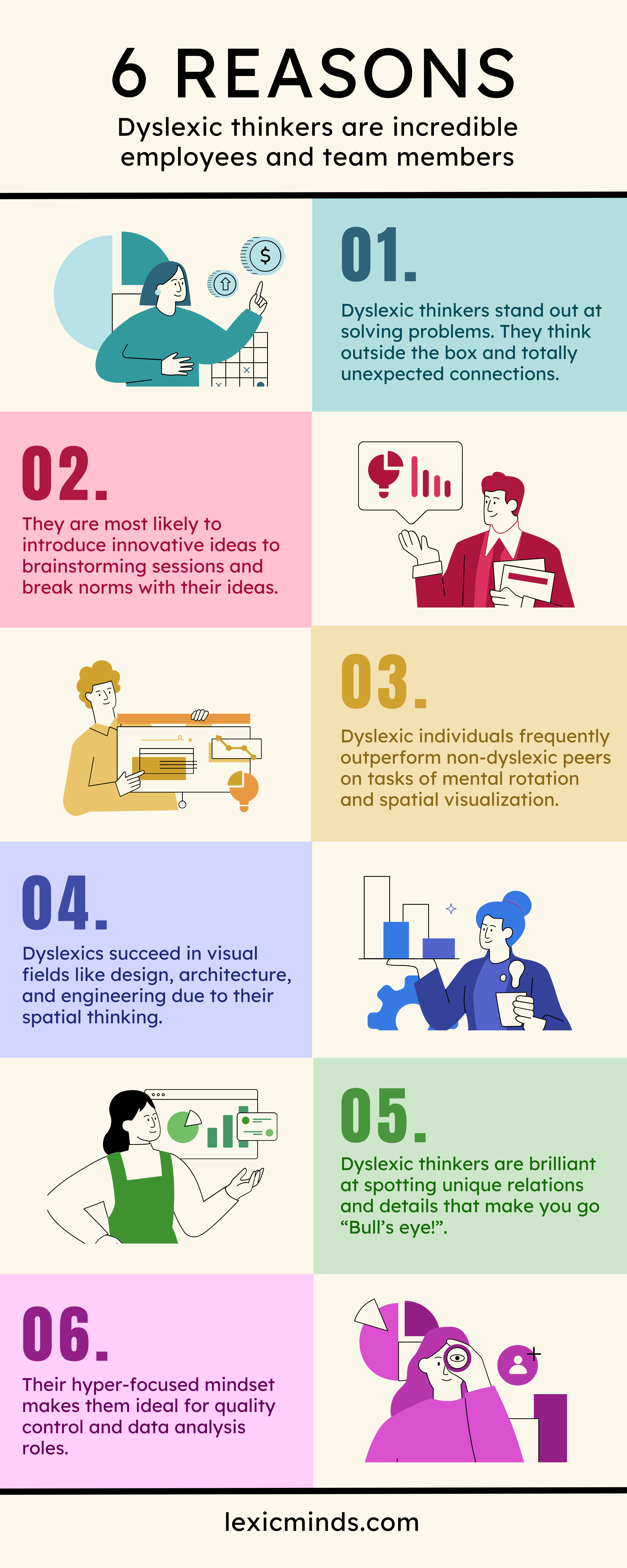Dyslexia is a neurological condition that impacts how a person processes language, making reading, writing, and spelling more difficult. While letters and words may get scrambled up, dyslexic brains are busy forging innovative cognitive strengths that are nothing short of superpowers. Read 12 reasons why dyslexic thinkers are great employees in this entry.┬Ā
The reality is that dyslexic minds are wired entirely differently, and they come with a kaleidoscope of intellectual strengths that are frequently overlooked.┬Ā
When the unique abilities of dyslexics are recognized and supported, they can outshine their coworkers in amazing ways. Actually, dyslexic individuals have unique strengths and qualities that make them valuable team players in the workplace.┬Ā
These exceptional humans have the potential to be your team’s MVP. ¤Åå
6 Cognitive Reasons Why Dyslexic Thinkers Are Great Employees
Buckle up. We are about to take a wild tour through the brilliant dyslexic brain and how they are rock stars at work.┬Ā
Let us break down Dyslexia’s greatest cognitive strengths and the reasons why they are valuable employees:
Reason #1 Problem-Solving Skills
Ability to think outside the box? Dyslexic minds love attacking problems through an entirely new dimension. While others are still stuck in tunnel vision, they are already turning obstacles inside out to reach the solution.
A study published in the journal Frontiers in Psychology found that dyslexic individuals demonstrate greater flexibility and creativity in problem-solving tasks compared to their non-dyslexic counterparts. The researchers attributed this to the dyslexic brain’s tendency to make unexpected connections and consider a wider range of possible solutions.┬Ā

Reason #2 Creative and Innovative Approaches
Does your team need disruptive ideas and fresh thinking? Dyslexic teammates will be your #1 support, ready to effortlessly break norms with their thoughts.┬Ā
What do we mean?┬Ā
For instance, Dyslexic entrepreneurs are more likely to introduce innovative products and services to the market compared to their non-dyslexic counterparts. Turns out that the cognitive strengths associated with Dyslexia, lateral thinking, and problem-solving skills, contribute to the tendency for innovation.
Reason #3 Visual-Spatial Abilities┬Ā
With their super-powered visual reasoning and perception, dyslexics do not just see the world differently. They interact with their surroundings from an alternate plane of spatial understanding.┬Ā
It is like a GPS for abstract thinking in their minds. Incredible, right?
Fun fact: Dyslexic individuals may outperform their non-dyslexic team members on tasks that require mental rotation and spatial visualization.┬Ā
Reason #4 Excellence in fields like Design, Architecture, and Engineering
It is no surprise: dyslexics succeed in visual fields like design, architecture, and engineering. Their ability to conceptualize and manipulate 3D space is unique.
If your company or the role you are hiring for is not focusing on these fields, remember that the unique qualities go beyond these areas and can be taken into roles such as software development, project management, coaching, and more.

Reason #5 Attention to Detail
You know those brilliant insights and “aha!” moments?
Dyslexic minds spot patterns and relationships that lead to those revelations.┬Ā
A study published by the International Mind, Brain, and Education Society found that dyslexic individuals outperformed their non-dyslexic peers on tasks that required the identification of subtle differences and the detection of hidden patterns.┬Ā
Reason #6 Valuable in Data Analysis and Quality Control
Need someone to dive deep into data, analyze systems, and ensure flawless quality control? Enlist a dyslexic inspector! Their hyper-focused attention to detail makes them ideal for these roles.
Dyslexic individuals are more likely to excel in roles that involve the identification of subtle differences or the detection of patterns in large datasets.┬Ā
Now you see?
The dyslexic intellect is something to be encouraged. When you level up with the dyslexic dynamite on your team, you get an ultra-cognitive force.┬Ā
6 Personal Qualities Why Dyslexic Thinkers Are Great Employees
The brilliance of dyslexic thinkers goes beyond their mind-bending cognitive skills. There is more: badass personal qualities that will make you wonder how teams could ever survive without them.
Quality #1 Perseverance and Resilience
Dyslexic individuals have an unstoppable spirit of perseverance. Their lives are a real-world masterclass in staring challenges straight in the eye and saying: “Bring it!”┬Ā
No hurdle is too high. No struggle is too daunting.

Quality #2 High Adaptability
As dyslexics have spent countless days breaking through academic obstacles, they have the ability to adapt to level ninjas. When others have it tough and get caught up in the same old thinking, they are already three steps ahead.┬Ā
Dyslexics are ready to adjust to change.
Quality #3 Strong Communication Skills
Need someone to captivate an audience and breathe life into any topic? Dyslexics are born storytellers! Their atypical mind’s eye allows them to tell on fresh perspectives and prepare creative sparks full of originality. Even the driest subjects are TED Talk-worthy.
Quality #4 Great Oral Expression
Writing may be challenging. The oral expression, on the other hand, is one of dyslexics’ superpowers. They have a magical way of spontaneously ideating a way to captivate an audience.┬Ā
Quality #5 Empathy and Understanding
Living with learning differences from day one gives you an empathy upgrade. Dyslexics are kind and tolerant, making them great teamwork players who are always ready to support their coworkers during brainstorming, sprints, and when finding solutions. They have an undisturbed compassion from an early age.
Quality #6 Great at Making Connections
Dyslexics can easily formulate profound connections across any background. They can slip into another’s perspective and establish real relationships with genuine understanding. There is an innate ability to put people at ease.┬Ā
Living, breathing examples of DEI in action.
Dyslexics are not just tolerant of diversity. They crave connecting with individuals across all cultures and backgrounds. That eager curiosity about different perspectives is rocket fuel for innovation and retention.
The brilliant differences go beyond the cognitive. Are you ready to boost your team’s strengths?

Workplace Accommodations and Strategies
Now. How to support dyslexic employees to potentialize their unique way of thinking? Even the tiniest shifts at work can help them thrive.
Here are some quick examples.
Remember to browse more of our blog entries to deepen into Dyslexia at work.
Encourage Assistive Technology and Tools
There is an absolute arsenal of precious assistive tools to accommodate dyslexic rockstars. We are talking about cool text-to-speech software, spellcheckers, word prediction keyboards, and more.┬Ā
Find 10 AI Tools for Dyslexic Thinkers here.
Create an Inclusive and Supportive Work Environment
The most innovative teams do not just tolerate differences. They enthusiastically embrace and encourage them.┬Ā
Recognize dyslexic employees and emphasize their perceptions. Workplaces can benefit when supporting their unique learning, communicative, and thinking styles.
Communicate Openly about Individual Needs
A safe, supportive atmosphere of understanding is rocket fuel for dyslexic visionaries. Let them know they can openly share their brilliance without fear of stigma or imposter syndrome.┬Ā
Imagine a world where difference is not just accepted but actively encouraged.
The evidence is crystal clear. An inclusive culture of belonging intensifies different ways of thinking and results in a beautiful symphony of innovation.┬Ā┬Ā
Points of Action
- If you are a manager: Involve in the assistive tech game. Get your dyslexic MVPs set up with AI tools or software, and learn to use them yourself!
- If you are a coworker: Ask your HR department about courses, training, or the company’s policies related to Dyslexia.┬Ā
- Everyone: Create psychologically safe spaces for open communication by openly accepting and encouraging differences.
Key Takeaways
- Dyslexic individuals have brilliant strengths like creativity, laser problem-solving skills, and galaxy-brain reasoning. They thrive where out-of-the-box thinking is needed the most.
- Dyslexic thinkers are great employees. They are unstoppable champions when it comes to interpersonal skills, which are highly required in teams during the AI era.
- With Simple accommodations and inclusive attitudes, Dyslexic employees will thrive and use their extraordinary talents for your organization.
Sources:
Dyslexic Thinking at Work by Kate Briggs
Dyslexia Basics – International Dyslexia Association
Developmental Dyslexia: Disorder or Specialization in Exploration?
The School’s Role in Creating Successful and Unsuccessful Dyslexics
Psychological Resources of Adults With Developmental Dyslexia
Visual Learning and the Brain: Implications for Dyslexia
Personal stories about learning and thinking differences
Disclaimer: This is not medical advice. Please consult with a licensed professional when in doubt. Lexicminds is not liable for actions taken from this page.







